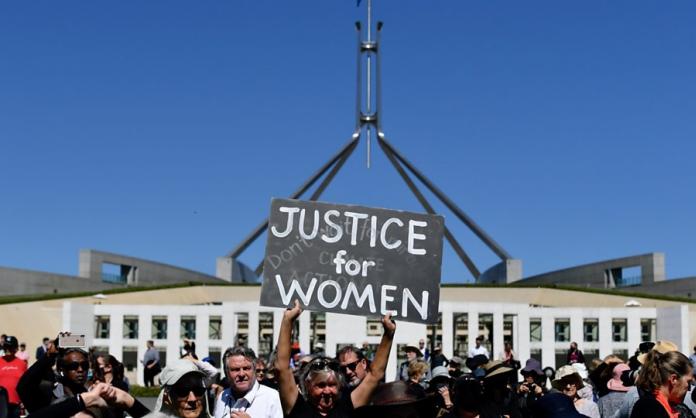More than 100,000 mostly women marched for justice, equality and respect on 15 March; what we got from Morrison was the political equivalent of Eddie McGuire’s “proud day for the Collingwood football club” press conference.
Instead of acknowledging his own government’s central role in generating anger on the streets—and in particular his own obstinate unwillingness to act on rape allegations against his attorney-general—Scott “how good is Australia?” Morrison suggested that protesters should be grateful that we had not been “met with bullets” as we might have been elsewhere. It was a “triumph of democracy”, apparently, that Morrison didn’t send troops to mow down the women marching against violence against women. Presumably, he came to this decision after taking advice from Jenny and the kids.
Riding this crisis out, as he so far has tried to do, is becoming increasingly untenable for the prime minister. The scale of the demonstrations, and the substantial media coverage they have received, are creating significant pressure. The government’s bad polling indicates that concern about government indifference to sexual assault goes well beyond the much-disparaged “inner-city elites” whom the Liberals delight in offending. Indeed, Morrison’s smug small-mindedness has achieved the impressive feat of uniting most women and a considerable proportion of men against his government.
A possible lifeline is Christian Porter’s defamation case against the ABC and journalist Louise Milligan, initiated on the same day as the March for Justice. After insisting that there should be no further investigations into the allegations—indeed, after saying that such a course of action would be a gross violation of the rule of law—Morrison now claims that defamation proceedings are the “appropriate” forum for the matter to be pursued.
It’s not hard to see why: they will likely stifle any further media coverage of the allegations, possibly for years, which will come as welcome relief for the government. The proceedings will also be framed around whether the attorney-general has been wronged, rather than the alleged rape victim. Given that an important part of the sentiment driving the demand for a formal inquiry is the right of Porter’s accuser to be heard, and to posthumously have the sympathetic hearing that was denied to her and so many other sexual assault victims in life, a Porter-as-victim scenario is an insult.
Further, the outcome of the proceedings will be hostage to the willingness of ABC management to take on Porter and his formidable legal team, and the way in which it decides to defend the charges. The ABC will ultimately pursue a course it determines to be in its interests, not those of the alleged victim, whether that be through reaching a settlement or fighting it out on the basis that its reporting was true or in the public interest. Either way, the ABC cannot be relied on, or expected, to have as its objective the testing of the credibility of the allegations. Especially considering the usual response of the public broadcaster to political pressure and threats is to accommodate, rather than resist.
It is also a problem that the court in which the case will be heard is one in which the judges are appointed by Porter, and whose career progression depends on winning favour with the plaintiff. Which only highlights the inappropriateness of such proceedings as a means to achieve any sort of justice in this case, even if the case does end up providing a means to test the allegations more formally. Whatever happens, Porter, and by default the government, will be in effective control. It will not be the independent, truth-seeking process that thousands rallied to demand.
If successful, Porter’s strategy of burying the allegations in the sort of complex legal and procedural morass that defamation proceedings are famous for will provide a great service to the government, and be far more effective than bullets. It will be quite an achievement—amassing and briefing a heavy hitting legal team, plotting to save his own political skin, making the latest move in the government’s long-running vendetta against the ABC as well as insulting sexual assault survivors—for someone on mental health leave.
But the fury that has been unleashed by this government’s callousness won’t simply subside. After all, Eddie McGuire wasn’t able to survive his ham-fisted attempt to head off a push for change. There’s a chance Morrison and Porter won’t either.









